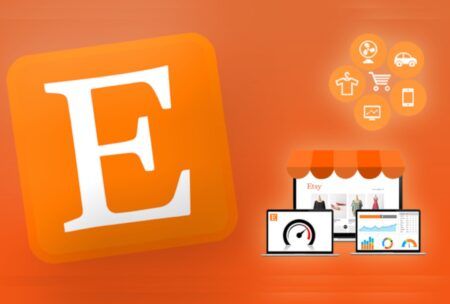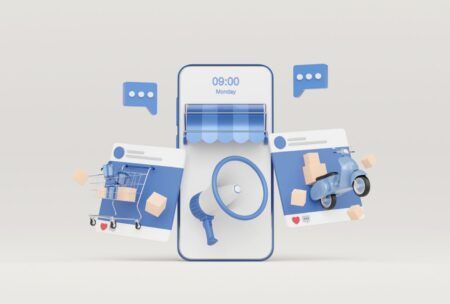6231 students have accelerated their skills with this course
Limited Time Offer: Get All Access Pass For Only $9/Month
CLICK HERE TO START
Business Courses
ECommerce Courses

Filters
Courses to get you started
Discover More In ECommerce Courses
Filters
ECommerce Courses

ECommerce is one of the fastest growing and most promising industries today. The 2021 estimates show that the eCommerce industry's value rose to $4.9 Trillion, but experts expect that the statistics will grow to at least 276.9% by 2023. While the COVID-19 pandemic ruined many industries, eCommerce was one of the few lucky ones that gained a financial bump.
The rise of eCommerce is not temporary. The statistics will change as the years pass by, but the accessibility and customizability of buying and selling online enable eCommerce to redefine the new normal. Interested parties should gain as much knowledge and skills on eCommerce before everything is too late.
It is a must to keep up with eCommerce trends, whether you are an ordinary consumer or an entrepreneur. One of the best ways to have updated knowledge and skills is by taking modern business courses made by the leading industry leaders of today. Notably, some of the entrepreneurship lessons you should not miss are those about home businesses and digital marketing.
Outperform the top players after accomplishing practical eCommerce courses at Skill Success. Then, expand your horizons by listening to comprehensive discussions recorded by renowned business people, academicians, and other experts. Regardless of your chosen business, our e-library should have something that will bolster your current competencies.
The rise of eCommerce is not temporary. The statistics will change as the years pass by, but the accessibility and customizability of buying and selling online enable eCommerce to redefine the new normal. Interested parties should gain as much knowledge and skills on eCommerce before everything is too late.
It is a must to keep up with eCommerce trends, whether you are an ordinary consumer or an entrepreneur. One of the best ways to have updated knowledge and skills is by taking modern business courses made by the leading industry leaders of today. Notably, some of the entrepreneurship lessons you should not miss are those about home businesses and digital marketing.
Outperform the top players after accomplishing practical eCommerce courses at Skill Success. Then, expand your horizons by listening to comprehensive discussions recorded by renowned business people, academicians, and other experts. Regardless of your chosen business, our e-library should have something that will bolster your current competencies.
Most commonly asked questions about ECommerce Courses
There is an unending variety of eCommerce courses. Some cover general concepts and the traditional setup of most businesses, while others specialize in one lesson and expound on it for a more intensive discussion. These types of courses are good, but it is the learners that decide which one is best.
The best eCommerce courses satisfy the needs of eCommerce business owners and other stakeholders to grow with their endeavors. No course is perfect, but the lessons should help learners gain an advantage over competitors. The conclusion of a chapter should leave a person wanting to learn more or improve their abilities.
The vast Skill Success e-library contains digital courses on multiple topics, including ones about the eCommerce industry. A single click can open many possibilities as the lessons are highly practicable. Learn from industry leaders and other professionals with outstanding reputations in their respective fields and change your life for the better.
Besides quality courses, Skill Success is also confident about the customer services we offer to clients. Sign up for our subscription program and unlock unlimited access to more than 3,000 courses. More importantly, there is no need to break the bank because our monthly subscription fee is only $15.
The best eCommerce courses satisfy the needs of eCommerce business owners and other stakeholders to grow with their endeavors. No course is perfect, but the lessons should help learners gain an advantage over competitors. The conclusion of a chapter should leave a person wanting to learn more or improve their abilities.
The vast Skill Success e-library contains digital courses on multiple topics, including ones about the eCommerce industry. A single click can open many possibilities as the lessons are highly practicable. Learn from industry leaders and other professionals with outstanding reputations in their respective fields and change your life for the better.
Besides quality courses, Skill Success is also confident about the customer services we offer to clients. Sign up for our subscription program and unlock unlimited access to more than 3,000 courses. More importantly, there is no need to break the bank because our monthly subscription fee is only $15.
ECommerce varies in forms and purposes. It has three types: business-to-business (B2B), business-to-consumer (B2C), and consumer-to-consumer. Each has unique structures and features that may not exist in the other types.
Studying every type will be helpful because they may react differently based on the circumstances. Here is a quick comparison:
1. Business-to-business (B2B). In simplest terms, B2B eCommerce is a commercial transaction wherein businesses buy and sell products or services to each other through a digital platform. This setup typically happens between manufacturers, retailers, and wholesalers. Companies opt for B2B eCommerce because it increases the efficiency of conducting sales and hastens the delivery of stocks.
There are a few eCommerce websites ideal for conducting B2B transactions. Some of the most used models are as follows: company websites, product supply and procurement exchanges, specialized or vertical industry portals, brokering sites, and information sites. It is uncommon for B2B transactions to use more than one model at once. B2B transactions happen regularly in the fashion industry. Designers, tailors, fabric producers, and retailers collaborate to produce clothes and sell them in online stores.
2. Business-to-consumer (B2C). B2C, otherwise known as retail eCommerce, refers to the sale of products or services between online businesses and customers. Stakeholders in this setup are keen on how the consumers' behavior changes from time to time. After all, it is a component that guides producers, sellers, and distributors in choosing what products and services they should release in the market.
B2C companies pose a major threat to brick-and-mortar stores because while both have similar features, the former offers better accessibility. In addition, B2C companies often mark up the prices of physical stores and receive little to no adverse reactions from consumers.
Amazon, eBay, and Priceline are some of the biggest B2C platforms today. They operate online and directly conduct business with consumers.
3. Consumer-to-consumer (C2C). C2C eCommerce is the sale or trade between two consumers through digital portals. The setup is similar to B2C eCommerce, in which one party acts as the seller and the other is the buyer. However, these two types of eCommerce should not be mistaken for each other.
In C2C eCommerce, the seller remains a consumer because they are not in the regular practice of selling products and services. The parties meet in a digital space and agree to exchange products or services for money. They are not acting in a business-like manner because the transactions are more direct and done in the absence of a middle man.
A relatable example would be how people meet on the Facebook Marketplace to sell personal belongings at a discounted price.
Studying every type will be helpful because they may react differently based on the circumstances. Here is a quick comparison:
1. Business-to-business (B2B). In simplest terms, B2B eCommerce is a commercial transaction wherein businesses buy and sell products or services to each other through a digital platform. This setup typically happens between manufacturers, retailers, and wholesalers. Companies opt for B2B eCommerce because it increases the efficiency of conducting sales and hastens the delivery of stocks.
There are a few eCommerce websites ideal for conducting B2B transactions. Some of the most used models are as follows: company websites, product supply and procurement exchanges, specialized or vertical industry portals, brokering sites, and information sites. It is uncommon for B2B transactions to use more than one model at once. B2B transactions happen regularly in the fashion industry. Designers, tailors, fabric producers, and retailers collaborate to produce clothes and sell them in online stores.
2. Business-to-consumer (B2C). B2C, otherwise known as retail eCommerce, refers to the sale of products or services between online businesses and customers. Stakeholders in this setup are keen on how the consumers' behavior changes from time to time. After all, it is a component that guides producers, sellers, and distributors in choosing what products and services they should release in the market.
B2C companies pose a major threat to brick-and-mortar stores because while both have similar features, the former offers better accessibility. In addition, B2C companies often mark up the prices of physical stores and receive little to no adverse reactions from consumers.
Amazon, eBay, and Priceline are some of the biggest B2C platforms today. They operate online and directly conduct business with consumers.
3. Consumer-to-consumer (C2C). C2C eCommerce is the sale or trade between two consumers through digital portals. The setup is similar to B2C eCommerce, in which one party acts as the seller and the other is the buyer. However, these two types of eCommerce should not be mistaken for each other.
In C2C eCommerce, the seller remains a consumer because they are not in the regular practice of selling products and services. The parties meet in a digital space and agree to exchange products or services for money. They are not acting in a business-like manner because the transactions are more direct and done in the absence of a middle man.
A relatable example would be how people meet on the Facebook Marketplace to sell personal belongings at a discounted price.
Doing eCommerce or online business is a risk, opportunity, and commitment. The outcomes can be vastly different depending on how you play your cards. While it has many components, the most critical part is the beginning.
Are you looking for answers on how to start an eCommerce business? Study this list:
1. Choose your niche. ECommerce is a broad industry with seemingly unlimited sub-industries. The more people discover how eCommerce functions and its latent potential, the industry keeps on growing. It may be impractical to learn everything about eCommerce at once, especially for beginners.
One of the best things to do is find a niche a be good at it. Then, after building authority over it, start exploring others.
2. Setup the legal structure of your eCommerce business. ECommerce businesses need a stable legal structure to operate and grow. Since every business has unique strengths, weaknesses, and other underlying factors, choosing a format that will optimize profitability and reduce risks is wise. In the United States, ECommerce stakeholders generally choose between sole proprietorship, general partnership, LLC, or corporation.
3. Acquire an EIN. An EIN or employer identification number is a requirement by the Internal Revenue Services (IRS) for stakeholders to operate eCommerce businesses. This 9-digit code enables owners to separate personal from corporate finances. Requesting an EIN is free, and it is possible to process it digitally, by mail, fax, or phone.
4. Process all necessary documents. The EIN is only one of the multiple documents that eCommerce starters should prepare. Depending on your chosen legal structure, the requirements may come from various agencies and entail different processing times. While online stores do not require as many conditions as brick-and-mortar stores, missing even a single one could result in a permanent denial to operate as an eCommerce infrastructure.
5. Select an eCommerce platform. After settling the internal eCommerce essentials, the next thing on the to-do list is to choose an appropriate eCommerce platform. Popular platforms like Shopify, WooCommerce, and Squarespace offer highly customizable interfaces that host companies' digital stores. This process also includes selecting a domain name and ensuring the website is accessible to the target market.\
6. Create or source products for your online business. Since setting up a website is akin to building a physical store, the logical next step would be filling said store with products and services. However, keeping an online store inventory can be tricky because stocks queue in between orders. Also, stakeholders should worry about product distributions and deliveries.
7. Implement eCommerce marketing strategies. Selling online means your marketing strategies should also be in the World Wide Web. ECommerce marketing is an integral part of any successful eCommerce store because builds online presence and creates a path for potential consumers to interact with the brand. Digital marketing analytics show that the most effective eCommerce marketing strategies today are influencer marketing, social media marketing, and email marketing.
1. Choose your niche. ECommerce is a broad industry with seemingly unlimited sub-industries. The more people discover how eCommerce functions and its latent potential, the industry keeps on growing. It may be impractical to learn everything about eCommerce at once, especially for beginners.
One of the best things to do is find a niche a be good at it. Then, after building authority over it, start exploring others.
2. Setup the legal structure of your eCommerce business. ECommerce businesses need a stable legal structure to operate and grow. Since every business has unique strengths, weaknesses, and other underlying factors, choosing a format that will optimize profitability and reduce risks is wise. In the United States, ECommerce stakeholders generally choose between sole proprietorship, general partnership, LLC, or corporation.
3. Acquire an EIN. An EIN or employer identification number is a requirement by the Internal Revenue Services (IRS) for stakeholders to operate eCommerce businesses. This 9-digit code enables owners to separate personal from corporate finances. Requesting an EIN is free, and it is possible to process it digitally, by mail, fax, or phone.
4. Process all necessary documents. The EIN is only one of the multiple documents that eCommerce starters should prepare. Depending on your chosen legal structure, the requirements may come from various agencies and entail different processing times. While online stores do not require as many conditions as brick-and-mortar stores, missing even a single one could result in a permanent denial to operate as an eCommerce infrastructure.
5. Select an eCommerce platform. After settling the internal eCommerce essentials, the next thing on the to-do list is to choose an appropriate eCommerce platform. Popular platforms like Shopify, WooCommerce, and Squarespace offer highly customizable interfaces that host companies' digital stores. This process also includes selecting a domain name and ensuring the website is accessible to the target market.\
6. Create or source products for your online business. Since setting up a website is akin to building a physical store, the logical next step would be filling said store with products and services. However, keeping an online store inventory can be tricky because stocks queue in between orders. Also, stakeholders should worry about product distributions and deliveries.
7. Implement eCommerce marketing strategies. Selling online means your marketing strategies should also be in the World Wide Web. ECommerce marketing is an integral part of any successful eCommerce store because builds online presence and creates a path for potential consumers to interact with the brand. Digital marketing analytics show that the most effective eCommerce marketing strategies today are influencer marketing, social media marketing, and email marketing.
Becoming an eCommerce expert takes time, energy, money, and other resources. Since not all eCommerce experts are the same, the time needed to be one can differ, too.
You must start somewhere to eventually become an eCommerce expert. There are a few things that you can do to help jumpstart your journey.
1. Understand the basics of an eCommerce business. Always start with the basics. Master how the simplest eCommerce businesses operate and gain as much knowledge from them. Eventually, your knowledge will expand, and you can begin to dabble into more complicated eCommerce issues.
2. Study search engine optimization. Search engine optimization or SEO is a pillar of eCommerce marketing since it drives organic traffic to the business' website. ECommerce experts should know the outlets and methods enabling online stores to gain more engagement.
3. Enhance your skills in eCommerce marketing. Becoming an eCommerce expert should not only focus on the business administration side of things but also on marketing. Effective marketing products and services will sustain the operations and growth of eCommerce businesses.
4. Stay updated with popular eCommerce platforms. The distribution of eCommerce platform market share in the United States changes drastically every year. Experts should know how and why these platforms change to give helpful insights on businesses figuring out the best outlets to feature their products and services.
5. Know about pay-per-click campaigns. Pay-per-click campaigns (PPCs) are fast, effective, and hassle-free options to grow online presence and make eCommerce sales. One of the most popular and used PPCs these days is Google Ads. It has features perfect for eCommerce stores, especially SMEs.
6. Gain knowledge and experience in content marketing. Content marketing is an effective method of creating a lasting relationship with consumers. Similar to SEO, content marketing plays a massive role in building the internet presence of an eCommerce business and making the products seem relevant to the target audience.
7. Improve your email marketing strategies. Email marketing is not dead and does some heavy lifting in eCommerce marketing. Almost everybody in the world has emails, and digitally active individuals use theirs almost daily. It is a tactic that helps online businesses stay in touch with their clients.
8. Boost your conversion rates. ECommerce marketing involves tons of hard work because campaigns usually have low conversion rates. A post or online activity may have a lot of impressions and interactions; they do not always convert into sales. ECommerce experts should be familiar with the different ways of driving more sales.
9. Try working for an eCommerce store. One of the first steps in becoming an expert is learning how experts ahead of you act. Working in an eCommerce store should give you a firsthand experience of the ins and outs of online business operations.
10. Build an eCommerce business. After learning how others work and gaining experience with them, you should try launching an eCommerce store of your own. No two businesses are the same so consistently implement solutions personalized according to your business needs.
You must start somewhere to eventually become an eCommerce expert. There are a few things that you can do to help jumpstart your journey.
1. Understand the basics of an eCommerce business. Always start with the basics. Master how the simplest eCommerce businesses operate and gain as much knowledge from them. Eventually, your knowledge will expand, and you can begin to dabble into more complicated eCommerce issues.
2. Study search engine optimization. Search engine optimization or SEO is a pillar of eCommerce marketing since it drives organic traffic to the business' website. ECommerce experts should know the outlets and methods enabling online stores to gain more engagement.
3. Enhance your skills in eCommerce marketing. Becoming an eCommerce expert should not only focus on the business administration side of things but also on marketing. Effective marketing products and services will sustain the operations and growth of eCommerce businesses.
4. Stay updated with popular eCommerce platforms. The distribution of eCommerce platform market share in the United States changes drastically every year. Experts should know how and why these platforms change to give helpful insights on businesses figuring out the best outlets to feature their products and services.
5. Know about pay-per-click campaigns. Pay-per-click campaigns (PPCs) are fast, effective, and hassle-free options to grow online presence and make eCommerce sales. One of the most popular and used PPCs these days is Google Ads. It has features perfect for eCommerce stores, especially SMEs.
6. Gain knowledge and experience in content marketing. Content marketing is an effective method of creating a lasting relationship with consumers. Similar to SEO, content marketing plays a massive role in building the internet presence of an eCommerce business and making the products seem relevant to the target audience.
7. Improve your email marketing strategies. Email marketing is not dead and does some heavy lifting in eCommerce marketing. Almost everybody in the world has emails, and digitally active individuals use theirs almost daily. It is a tactic that helps online businesses stay in touch with their clients.
8. Boost your conversion rates. ECommerce marketing involves tons of hard work because campaigns usually have low conversion rates. A post or online activity may have a lot of impressions and interactions; they do not always convert into sales. ECommerce experts should be familiar with the different ways of driving more sales.
9. Try working for an eCommerce store. One of the first steps in becoming an expert is learning how experts ahead of you act. Working in an eCommerce store should give you a firsthand experience of the ins and outs of online business operations.
10. Build an eCommerce business. After learning how others work and gaining experience with them, you should try launching an eCommerce store of your own. No two businesses are the same so consistently implement solutions personalized according to your business needs.
In 2021, the number of online shoppers worldwide rose to 2.4 billion, prompting online businesses to churn digital marketing strategies one after the other. For this reason, the need for eCommerce specialists grows even more because companies need someone to guide them through digital marketing and other similar endeavors. Becoming an eCommerce specialist in this era holds positive prospects.
An eCommerce specialist is someone who wears multiple hats at once. They are responsible for the overall growth of an eCommerce business by improving several critical aspects like customer service, inventory management, marketing, and technological development. Companies usually hire them to track digital traffic and enhance engagement rates to company websites, social media accounts, and other digital platforms.
Aside from having high availability, the eCommerce specialist job tends to pay well. Depending on the state, this position can pay up to $25 per hour on top of mandated government benefits. Freelance eCommerce specialists can earn more after building industry authority and accomplishing a series of successful eCommerce projects.
The eCommerce specialist job is ideal for career development and financial stability. So keep learning new knowledge and skills to get more out of this career. Skill Success has a plethora of eCommerce courses perfect for beginners, career shifters, and even experts.
An eCommerce specialist is someone who wears multiple hats at once. They are responsible for the overall growth of an eCommerce business by improving several critical aspects like customer service, inventory management, marketing, and technological development. Companies usually hire them to track digital traffic and enhance engagement rates to company websites, social media accounts, and other digital platforms.
Aside from having high availability, the eCommerce specialist job tends to pay well. Depending on the state, this position can pay up to $25 per hour on top of mandated government benefits. Freelance eCommerce specialists can earn more after building industry authority and accomplishing a series of successful eCommerce projects.
The eCommerce specialist job is ideal for career development and financial stability. So keep learning new knowledge and skills to get more out of this career. Skill Success has a plethora of eCommerce courses perfect for beginners, career shifters, and even experts.
ECommerce can be profitable, especially when compared to traditional retail. A successful eCommerce business can quickly regain the capital investment in less than a year. However, this is only possible with careful planning, appropriate marketing methods, and establishing strong connections with a specified target audience.
One of the key reasons why eCommerce businesses are more likely to be profitable is that they do not suffer the same challenges that physical stores do. Selling products and services online can cost less compared to maintaining brick-and-mortar stores. Besides the actual store, eCommerce stakeholders can even save on operational costs because only fewer employees are needed.
Another reason why eCommerce has high profitability is the speed of the transactions. Online buying and selling propel financial transactions as well as the economic growth of a business. The usage of appropriate tools, methods, and systems can help ensure that an eCommerce business will continuously remain successful.
Building a successful eCommerce business does not happen overnight. If you are planning to start an online store of your own, one preparation you should not skip is learning the eCommerce fundamentals. Learn relevant lessons in eCommerce by browsing Skill Success' regularly updated e-library without the hassle and pressure of attending traditional classes.
One of the key reasons why eCommerce businesses are more likely to be profitable is that they do not suffer the same challenges that physical stores do. Selling products and services online can cost less compared to maintaining brick-and-mortar stores. Besides the actual store, eCommerce stakeholders can even save on operational costs because only fewer employees are needed.
Another reason why eCommerce has high profitability is the speed of the transactions. Online buying and selling propel financial transactions as well as the economic growth of a business. The usage of appropriate tools, methods, and systems can help ensure that an eCommerce business will continuously remain successful.
Building a successful eCommerce business does not happen overnight. If you are planning to start an online store of your own, one preparation you should not skip is learning the eCommerce fundamentals. Learn relevant lessons in eCommerce by browsing Skill Success' regularly updated e-library without the hassle and pressure of attending traditional classes.
Shopify is one of the most buzzing names you will encounter when creating an online store. It is a Canadian multinational e-commerce company that hosts eCommerce websites for buying and selling products online. Users can utilize the Shopify program, customize a retail point-of-sale system setup, and cater to eCommerce transactions.
Shopify is among the top picks when starting a business online. You do not need to be a programmer or a web designer to set up a functional website because the settings are user-friendly. Should you have questions about any of its features, Shopify has a responsive customer service you can contact.
For non-tech experts, using and managing Shopify can be quite the learning curve, but there are instructions you can easily find online. Take your time to follow the steps and familiarize the functions of every feature. Also, find time to practice because it might be challenging to learn everything in just one try.
Shopify guidelines for beginners:
1. Try Shopify's free trial program.
2. Familiarize the dashboard's features.
3. Personalize the theme of your eCommerce website.
4. Create sales channels for your eCommerce website.
5. Stock products for your eCommerce store.
6. Ensure all payment channels are working.
7. Setup an eCommerce store domain.
8. Launch your eCommerce site.
9. Choose a Shopify pricing plan that suits your eCommerce business.
10. Calibrate Shopify Apps to customize your own online business website.
Shopify is among the top picks when starting a business online. You do not need to be a programmer or a web designer to set up a functional website because the settings are user-friendly. Should you have questions about any of its features, Shopify has a responsive customer service you can contact.
For non-tech experts, using and managing Shopify can be quite the learning curve, but there are instructions you can easily find online. Take your time to follow the steps and familiarize the functions of every feature. Also, find time to practice because it might be challenging to learn everything in just one try.
Shopify guidelines for beginners:
1. Try Shopify's free trial program.
2. Familiarize the dashboard's features.
3. Personalize the theme of your eCommerce website.
4. Create sales channels for your eCommerce website.
5. Stock products for your eCommerce store.
6. Ensure all payment channels are working.
7. Setup an eCommerce store domain.
8. Launch your eCommerce site.
9. Choose a Shopify pricing plan that suits your eCommerce business.
10. Calibrate Shopify Apps to customize your own online business website.
Shopify is not a complicated app to operate, but for many, it may take a few attempts to be comfortable using it. Like other things in life, it is completely normal not to be good with Shopify in just a few tries. It is a common dilemma for regular shop owners with no background in web design.
Your effort in learning how to use Shopify will be worth it because it is among the most relevant eCommerce platforms today. As of 2022, there are over 1 million shops in Shopify from 175 countries. Even consumers prefer using Shopify when buying products online because of the ease they experience in every transaction.
Instead of learning the controls and settings yourself, avoid the stress by learning from the experts. Numerous Shopify tutorials and online courses exist detailing common fixes relating to the program's issues. Find ones that focus on the most interesting and relevant topics and try practicing the techniques multiple times.
Unfortunately, not all you find online is authentic, verifiable, and trustworthy. Avoid wasting your time on resources that will not add value to you as a consumer and a business owner. Skill Success has over 3,000 courses; each course is designed by industry professionals who long built a name for themselves.
Your effort in learning how to use Shopify will be worth it because it is among the most relevant eCommerce platforms today. As of 2022, there are over 1 million shops in Shopify from 175 countries. Even consumers prefer using Shopify when buying products online because of the ease they experience in every transaction.
Instead of learning the controls and settings yourself, avoid the stress by learning from the experts. Numerous Shopify tutorials and online courses exist detailing common fixes relating to the program's issues. Find ones that focus on the most interesting and relevant topics and try practicing the techniques multiple times.
Unfortunately, not all you find online is authentic, verifiable, and trustworthy. Avoid wasting your time on resources that will not add value to you as a consumer and a business owner. Skill Success has over 3,000 courses; each course is designed by industry professionals who long built a name for themselves.
Before, Shopify was relatively simple that it did not require coding to edit the settings and other features. When the management improved the system and added more advanced features, Shopify started running on the Liquid programming language. Interested users can still build Shopify-hosted websites without any programming skills, but there are intricate features that may need them.
Generally, Shopify runs on Liquid as its templating language. This language is present in almost all available theme files, but there are also other types of coding languages that account holders may use to customize their websites. Others use HTML, CSS, JSON, and JavaScript to edit themes and personalize settings.
You do not need to be a master coder to access Shopify, but it is a convenient skill to have more freedom with the design and functions of your website. Other than website design, coding can also be useful in other eCommerce transactions. Almost every digital activity today has some coding component to them.
Coding looks intimidating at first, but with access to reliable tools, it will be easier to understand the complexities behind every coding system. Skill Success has introductory, intermediate, and master-level coding courses that will prepare stakeholders for their eCommerce transactions and other digital events. In addition, every class has step-by-step instructions you can replicate by yourself.
Generally, Shopify runs on Liquid as its templating language. This language is present in almost all available theme files, but there are also other types of coding languages that account holders may use to customize their websites. Others use HTML, CSS, JSON, and JavaScript to edit themes and personalize settings.
You do not need to be a master coder to access Shopify, but it is a convenient skill to have more freedom with the design and functions of your website. Other than website design, coding can also be useful in other eCommerce transactions. Almost every digital activity today has some coding component to them.
Coding looks intimidating at first, but with access to reliable tools, it will be easier to understand the complexities behind every coding system. Skill Success has introductory, intermediate, and master-level coding courses that will prepare stakeholders for their eCommerce transactions and other digital events. In addition, every class has step-by-step instructions you can replicate by yourself.




































































